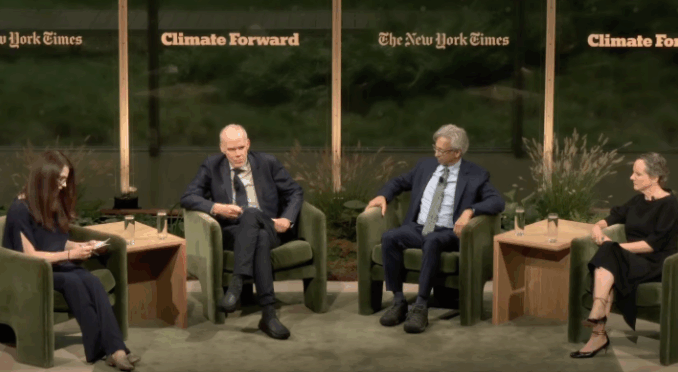
BY SARAH O’CONNELL
As China increases its commitment to clean energy, climate activists at the September 24th New York Times Climate Forward event warned,\ the United States must increase access to inexpensive renewable energy – or risk its economy falling behind. At the same time, climate leaders described a need to respond to the current U.S. political climate through bipartisan messaging.
Before a live audience at the Times Center in Manhattan, NYT climate reporter Cara Buckley asked a panel where the climate movement can go in the face of President Donald Trump’s continued attacks on climate science.
Trump, who called climate change the “greatest con job ever perpetrated on the world” in front of the United Nations General Assembly on September 23, withdrew the United States from the Paris climate agreement during both his first and second term in office, and passed a budget bill described by longstanding environmental organization The Sierra Club as the “most anti-environment bill in history.”
In contrast, at the U.N., China announced it will be following a greener path. A day after Trump’s speech decrying climate science, Chinese President Xi Jinping pledged to cut pollution levels by 10% during the next decade, and to increase wind and solar energy production. While China is the world’s largest carbon emitter, it hosts almost half of the world’s operating wind and solar capacity, according to Climate Council, an Australian independent climate organization.
During the panel “Climate Activism in the Age of Trump,” noted author and climate activist Bill McKibben warned that if Trump continued to block clean energy projects, the country would soon be seen as the “Colonial Williamsburg of internal combustion.” He added that because the U.S. economy would be unable to compete with other world superpowers having access to cheap renewable energy, this was unlikely to ultimately happen. “The U.S., in the last eight months, is surrendering economic, technological, and probably political primacy to China,” he said.
Panelists also discussed what the climate movement could take away from the outcome of the 2024 Presidential election. Among them were Manish Bapna, President and C.E.O. of the Natural Resources Defense Council, a nonprofit environmental advocacy group, and Abigail Dillen, President of environmental law nonprofit Earthjustice.
According to Pew Research polling conducted shortly before the 2024 presidential election, only 37% of registered voters said that climate change was “very important” to their vote. In contrast, issues such as the economy (81%) and healthcare (65%) were very important in considering how one’s ballot would be cast.
The disconnect between these figures illustrates how climate advocates need to show voters how climate change fuels the rising cost of living, “connecting the dots between climate, between clean energy, and kind of the kitchen table issues that people do care about,” said Bapna.
According to a study by the Barcelona Supercomputer Center, a research institute in Barcelona, Spain, extreme weather caused by climate change has forced food prices to increase worldwide. The study found that after the western United States faced extreme heat and water shortages during the summer of 2022, the price of vegetables rose 80% in California and Arizona in November 2022.
As Americans are increasingly feeling the effects of climate change, many in the Trump administration deny that climate change mitigation is in the public’s best interest. During a separate Climate Forward panel, Trump-appointed Secretary of Energy Chris Wright denied that programs to limit the effects of climate change would benefit Americans, saying supporters of the Paris Agreement were “a club of people that have lost sight of the interests of their own people.”
The Department of Energy recently announced that the department would return billions to the Treasury that had been allocated for clean energy projects under the Biden administration. “The more people have gotten into so-called climate action, the more expensive their energy has become,” Wright said in a press conference on September 24. “That lowers people’s quality of lives and reduces their life opportunities.”
Attitudes such as Wright’s reflect the partisan divide on the climate change issue. According to 2025 Pew Research polling, only 24% of Republican respondents saw global climate as a major threat to the U.S., compared to 78% of Democrats.
During the panel, guests discussed strategies on how climate activists could bridge this gap. Dillen described how renewable infrastructure often had bipartisan support, because, in a cost-of-living crisis, “the state regulators who have to face people whose bills are going up are going to keep choosing clean.” She later added that activists needed to not let the narrative around climate change divide people, and instead focus on the real climate-related issues Americans are facing, such as the impact of worsening extreme weather, which she said 30 million Americans report being directly affected by.
Bapna described how his organization had worked with electricians unions in Ohio to create vocal support for solar infrastructure, adding that the “toxic discourse” in Washington D.C. should not outweigh what was happening on the ground in both red and blue states.
A 2024 survey by the Global Strategy Group (GSG), North Star, and the Solar Energy Industries Association (SEIA) found that 87% of Americans support the Inflation Reduction Act’s federal clean energy tax credits, and 75% agree that solar is good for the economy.
Delivering closing remarks, the panelists reiterated the need for America to join the rest of the world in investing in clean energy or risk being left behind. “We have a chance to move into a new world,” said McKibben, adding that the United States is the only place resisting this transition. “We’re either going to be left behind, or we’re going to do our job and make the case to the American people that they want to be part of the future too.”
